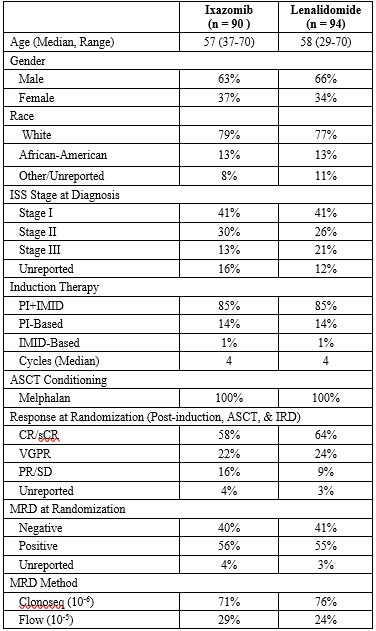Background: Maintenance therapy with lenalidomide post-autologous stem cell transplantation (ASCT) has shown to improve progression-free survival (PFS) in multiple myeloma (MM), and has largely become the standard of care. However, toxicity leads to early discontinuation in nearly one-third of patients and additional options are needed (McCarthy, et al, JCO, 2017). Ixazomib is another maintenance option that has been shown to improve PFS; however, studies comparing lenalidomide and ixazomib are lacking. In this randomized phase 2 study, we analyzed the safety and efficacy of using lenalidomide and ixazomib as part of consolidation and maintenance therapies after ASCT (NCT02253316).
Methods: Eligible patients, age 18-70 with newly diagnosed MM undergoing ASCT during first-line treatment, were consented prior to ASCT. Approximately 4 months following ASCT, patients received 4 cycles of consolidation therapy with IRd [ixazomib 4 mg on days 1, 8 and 15 of a 28-day cycle, lenalidomide 15 mg on days 1 through 21, and dexamethasone 40 mg on days 1, 8 and 15]. Primary data on IRd consolidation were presented at ASH 2018 (Abstract 109920).
One month after the last consolidation cycle, patients were randomized (1:1) to maintenance therapy with single-agent ixazomib (4 mg on days 1, 8 and 15 of a 28-day cycle) or lenalidomide (10 mg daily months 1-3 followed by 15 mg for months 4+). The arms were stratified based on MRD-status post-consolidation. In total, 237 patients were enrolled from 10 US centers. This abstract coincides with planned interim analysis 3 which is the first comparison of ixazomib and lenalidomide maintenance. While the study was not powered to compare PFS between the two arms, the sample will provide a reasonable power to estimate non-inferiority. There is a planned stopping rule for non-inferiority set at a hazard ratio of >1.3 in favor of lenalidomide. Secondary end-points include MRD-negativity following 12 cycles and toxicity.
Results: At time of abstract submission, 215 patients had completed IRd consolidation and 191 had begun maintenance. 90 were randomized to ixazomib and 94 to lenalidomide. 7 patients were not randomized due to toxicity during consolidation; data from these patients are not included in the analyses. The characteristics of the two arms are summarized in Table 1.
Hematologic toxicity has been infrequent with ixazomib with neutropenia and thrombocytopenia occurring in 11% and 23% of patients. In comparison, neutropenia and thrombocytopenia occurred in 45% and 35% of patients on lenalidomide. The most common non-hematologic toxicities in both arms have been GI-related and infections, both expected events. 16% of patients on ixazomib have experienced Grade 3-4 non-hematologic toxicity compared to 34% on lenalidomide. No grade 3 or higher peripheral neuropathy has been reported in either arm.
11% of patients on ixazomib have discontinued due to toxicity and another 9% have required a dose reduction to 3mg. Lenalidomide toxicity has led to discontinuation in 15% of patients and another 12% were dose reduced to 5mg. Only 45% of patients receiving 4+ cycles of lenalidomide were able to titrate to the 15mg dose.
After a median follow-up of 11.2 months from randomization (19.7 months post-ASCT), 30% of patients on ixazomib have discontinued treatment due to disease progression. After a median follow-up of 12.3 months from randomization (20.2 months post-ASCT), 18% patients on lenalidomide have discontinued treatment due to disease progression.
Conclusion: Ixazomib and lenalidomide maintenance have been well tolerated to date. A comparison of PFS is currently being conducted as part of interim analysis 3 and final results will be presented, representing the first report directly comparing lenalidomide and ixazomib maintenance.
Table 1:
Vij:Genentech: Honoraria; Karyopharm: Honoraria; Celgene: Honoraria, Research Funding; Bristol-Myers Squibb: Honoraria, Research Funding; Takeda: Honoraria, Research Funding; Janssen: Honoraria; Sanofi: Honoraria. Martin:Amgen, Sanofi, Seattle Genetics: Research Funding; Roche and Juno: Consultancy. Fiala:Incyte: Research Funding. Deol:Novartis: Other: Advisory board; Kite: Other: Advisory board; Agios: Other: Advisory board. Kaufman:Celgene: Consultancy; Winship Cancer Institute of Emory University: Employment; Amgen: Consultancy; Bristol-Myers Squibb: Consultancy; Pharmacyclics: Membership on an entity's Board of Directors or advisory committees; AbbVie: Consultancy; Janssen: Honoraria; Incyte: Consultancy; Karyopharm: Membership on an entity's Board of Directors or advisory committees; TG Therapeutics: Consultancy; Takeda: Consultancy. Hofmeister:Karyopharm: Membership on an entity's Board of Directors or advisory committees; Janssen: Membership on an entity's Board of Directors or advisory committees; Oncopeptides: Membership on an entity's Board of Directors or advisory committees; Celgene: Honoraria; Nektar: Honoraria, Membership on an entity's Board of Directors or advisory committees; Imbrium: Membership on an entity's Board of Directors or advisory committees. Gregory:Poseida: Research Funding; Celgene: Speakers Bureau; Amgen: Speakers Bureau; Takeda: Speakers Bureau. Berdeja:AbbVie Inc, Amgen Inc, Acetylon Pharmaceuticals Inc, Bluebird Bio, Bristol-Myers Squibb Company, Celgene Corporation, Constellation Pharma, Curis Inc, Genentech, Glenmark Pharmaceuticals, Janssen Biotech Inc, Kesios Therapeutics, Lilly, Novartis, Poseida: Research Funding; Poseida: Research Funding; Amgen Inc, BioClinica, Celgene Corporation, CRISPR Therapeutics, Bristol-Myers Squibb Company, Janssen Biotech Inc, Karyopharm Therapeutics, Kite Pharma Inc, Prothena, Servier, Takeda Oncology: Consultancy. Chari:Amgen: Consultancy, Membership on an entity's Board of Directors or advisory committees, Research Funding; Bristol-Myers Squibb: Consultancy; Celgene: Consultancy, Membership on an entity's Board of Directors or advisory committees, Research Funding; Millennium/Takeda: Consultancy, Membership on an entity's Board of Directors or advisory committees, Research Funding; Janssen: Consultancy, Membership on an entity's Board of Directors or advisory committees, Research Funding; Karyopharm: Consultancy, Membership on an entity's Board of Directors or advisory committees; Array Biopharma: Research Funding; GlaxoSmithKline: Research Funding; Novartis Pharmaceuticals: Research Funding; Oncoceutics: Research Funding; Pharmacyclics: Research Funding; Seattle Genetics: Membership on an entity's Board of Directors or advisory committees, Research Funding; Sanofi: Membership on an entity's Board of Directors or advisory committees. Rosko:Vyxeos: Other: Travel support.
Author notes
Asterisk with author names denotes non-ASH members.


This feature is available to Subscribers Only
Sign In or Create an Account Close Modal